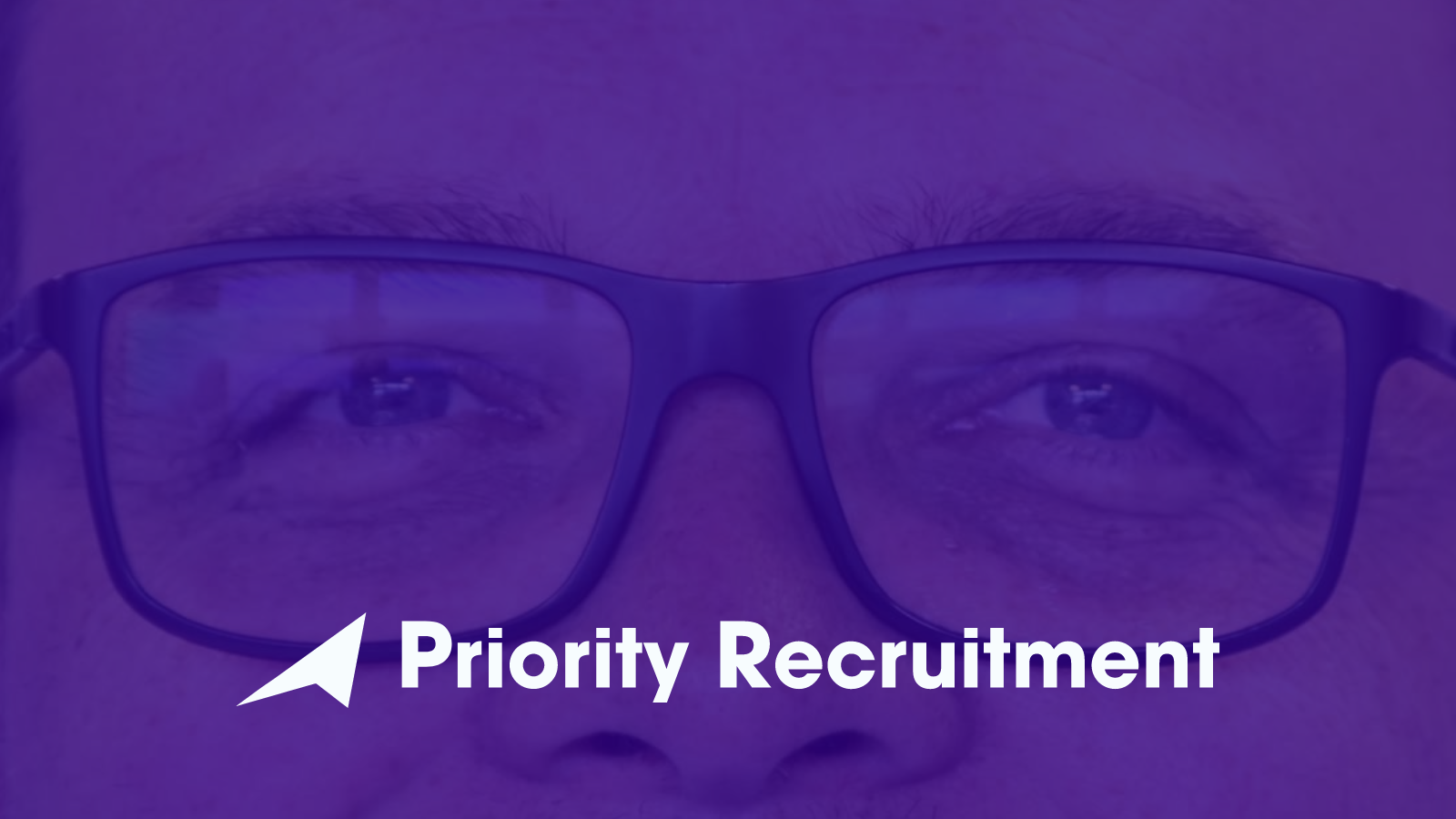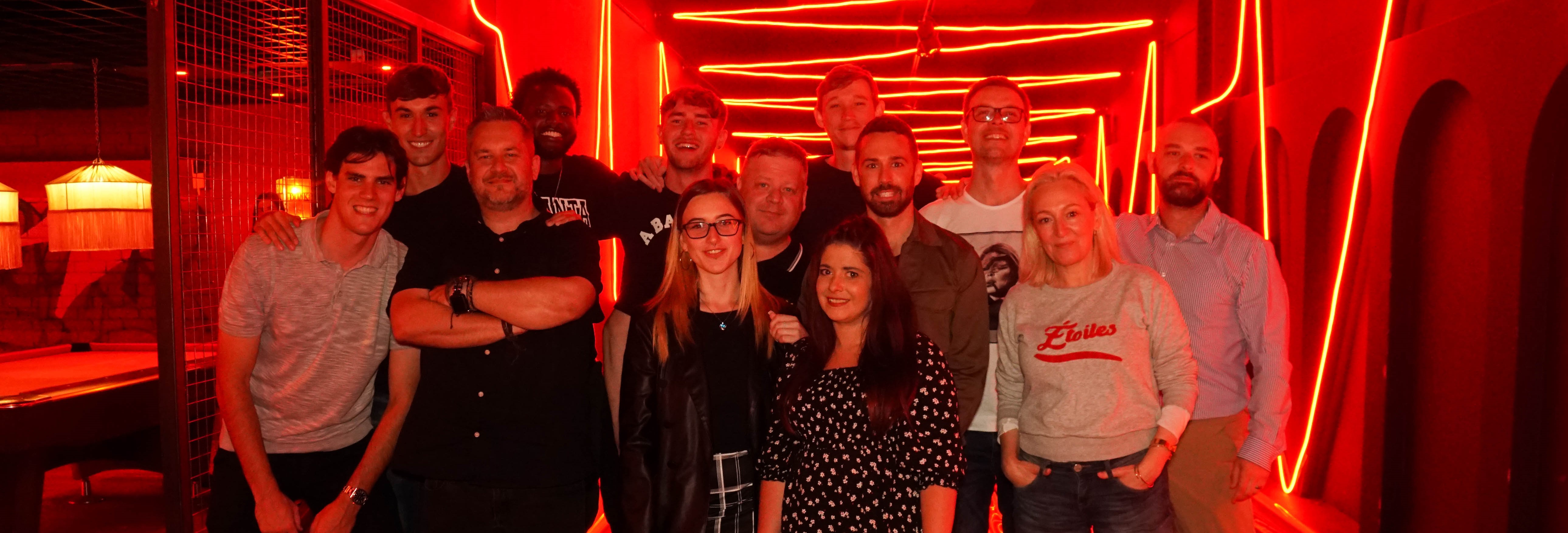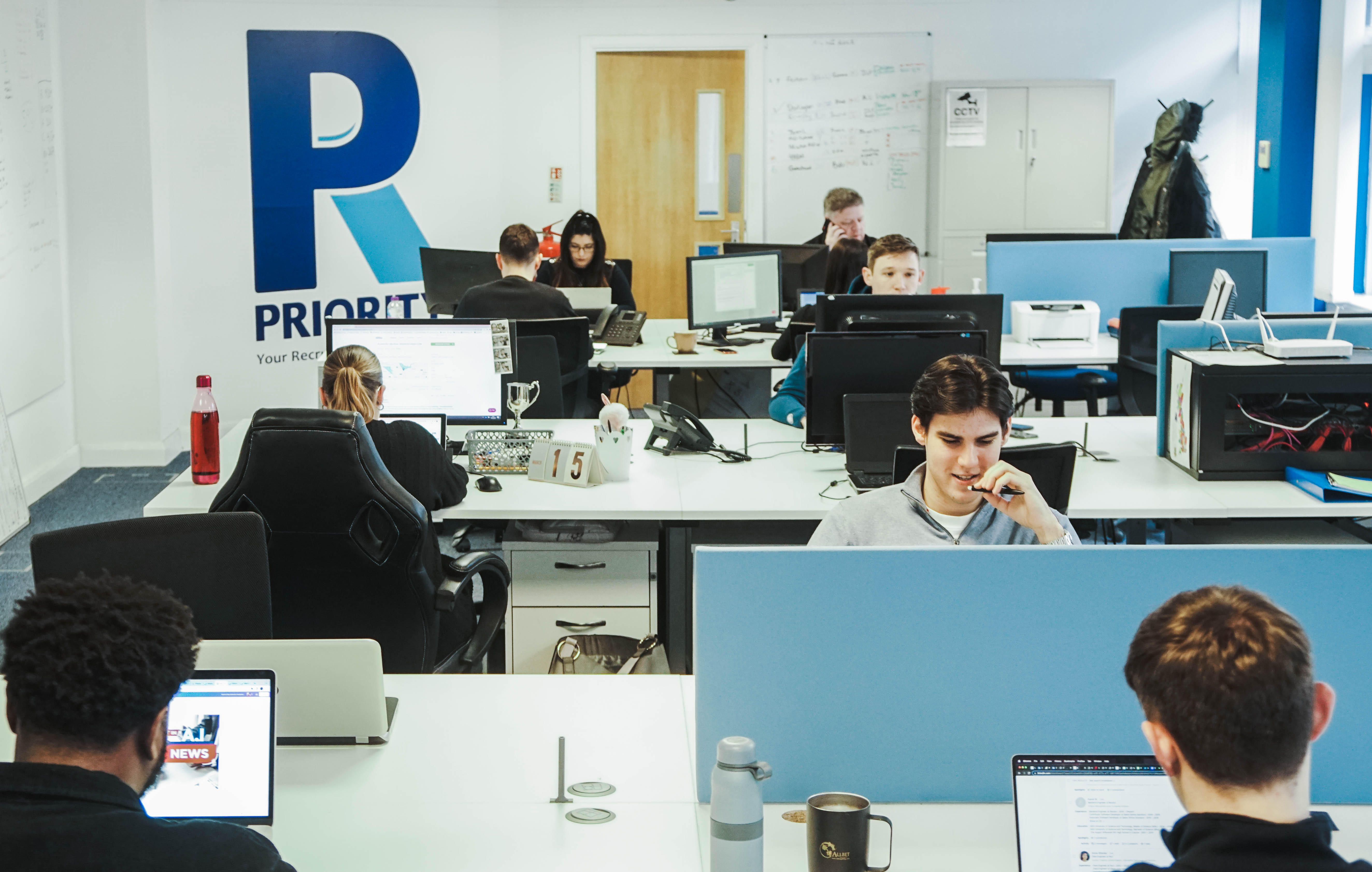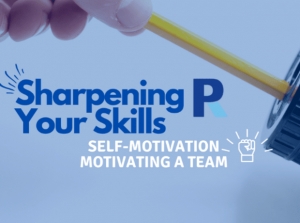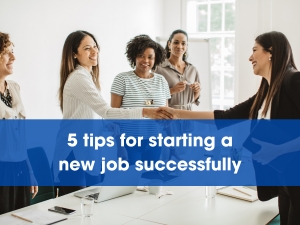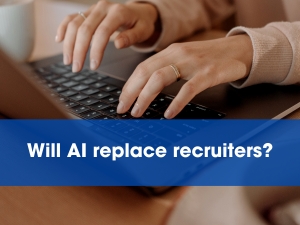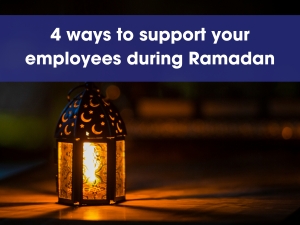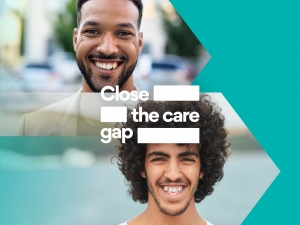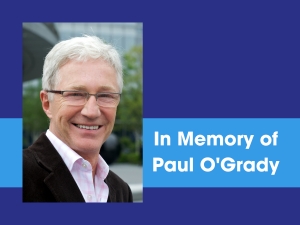Chris Potter
Priority Recruitment Supports Winston’s Wish
Priority Recruitment is proud to announce their support of Winston’s Wish.
Winston's Wish support children with family bereavements and was the first charity to establish child bereavement support services in the UK, they continue to lead the way in providing specialist child bereavement support services across the UK, including in-depth therapeutic help in individual, group and residential settings.
https://www.winstonswish.org.uk/
We will be doing a series of things to actively support the charity, but at any point, you can donate here: https://www.justgiving.com/fundraising/priorityrecruitment
How do I motivate myself and my team?
Known to be LinkedIn users’ favourite topic, motivation borders closely with productivity, both individually and as part of a team, so is clearly a popular topic on a professional social – so popular that I must see about 10 posts a day on the subject. Although these people make it seem as though it’s a fairly straightforward process, motivation is something that seems simple, but is actually rather intricate in its make-up – it’s never as easy as “just do it,” no matter what Shia LeBeouf or your favourite LinkedIn influencer says.
Motivation borders closely with numerous aspects of developing and maintaining a fulfilling work life. The reason for that is extremely simple: when you’re motivated, you’re more productive, you’re happier and it all just seems to fit and work a little better. Your work ethic and motivation are more than just finding the nuts to get out of bed and into the office each morning, it’s about continuing to push yourself further and further – not settling for where you’re at, or the position you’re filling.
“Gentleness doesn’t get work done unless you happen to be a hen laying eggs.”
- Coco Chanel
Whether you’re reading this as a manager hoping to implement and inspire motivation in your team, or as an employee looking to motivate yourself, you’re one of two things: intrinsically motivated, or extrinsically. What’s the difference, I hear you cry?
“Some authors have defined intrinsic motivation in terms of the task being interesting, while others have defined it in terms of the satisfactions a person gains from intrinsically-motivated task engagement.” – Richard M. Ryan, Intrinsic and Extrinsic Motivations, 2000
Being intrinsically motivated is more to do with the enjoyment and emotional gain you get from a task, rather than anything external. So, to hypothesise that into your work life, is your work more about what you’re doing, emotional reward rather than materialistic gain, and is that why you’re motivated to continue? Or is it more to do with the trust of your employer and increased responsibility in your role?
“Extrinsic motivation is a construct that pertains whenever an activity is done in order to attain some separable outcome. Extrinsic motivation thus contrasts with intrinsic motivation, which refers to doing an activity simply for the enjoyment of the activity itself, rather than its instrumental value.” - Richard M. Ryan, Intrinsic and Extrinsic Motivations, 2000
When comparing the two, extrinsic is most easily explained as materialistic gain from the task or role you’re doing for work. The most convenient example of this is financial gain – if you’re extrinsically motivated by money, then financial incentives in your or your employee’s role will lead to higher productivity.
A perfect example of a manager tapping into an extrinsically motivated individual happened right here, at Priority. When one of our employees started, he was uniquely motivated by the possibility of owning a Mustang eventually. Dan Franklin, being the inspirational manager he is, quickly identified the extrinsic motivation preference and thought it was important for the employee to visualise his success. The next day, Dan came in with a little toy Mustang for the employee's desk for daily motivation and a reminder as to what he’s striving towards.
As with most things, your motivation, and indeed individual members of your team, is subjective. Motivation, although perhaps intricate in its nature, is not complicated (once you know what motivates the individual). When extrinsically motivated: find your motivation, abuse it, set targets, set goals; reward said goals and targets once achieved; then, set new goals, set new targets. Keep going. If you’re intrinsically motivated, identify what it is about your role that is so rewarding, if you’re motivated by the possibility of progression and more responsibility, put a plan in place with your manager; if you’re motivated by emotional gain, do more of it!
What are you waiting for? Go and have that conversation. Increase your own, or your team’s motivation today!
5 Tips For Starting A New Job Successfully
Congratulations on your new job! Do you feel intimidated and overwhelmed? Are you not sure what to expect? Well, we are here to prepare you for your first day. Starting a new job can be stressful; you will not only receive a large amount of fresh information at once, but you will also have to obtain it efficiently. You have probably met some of your colleagues, however, there will be plenty of names to learn and remember. To be successful, both professionally and socially, you must master the corporate culture including lingo, dress code and manners. Here are 5 steps to prepare you for this new, exciting chapter:
- Start before you start
Even if you haven’t officially started yet, there are plenty of preparations you can do to make sure everything runs smoothly on your first day. Contact your manager for suggestions on how to prepare; whether it's through social media or a link to the company's website, learning more about how the company functions and reading more about the team is valuable.
- Talk to friends and family
Talking to someone about starting a new job could be quite helpful. Chances are they can provide tips and tricks while sharing their own experiences on the topic. Knowing what to do and what not to do will help you feel more confident, and you'll be able to make better decisions in your new employment.
- Do a test run of everything
There’s no such thing as being too prepared. If you have to commute, think about transportation and go to your location to check how long the trip will take. If you work remotely, test your internet connection, software and any other equipment the job requires. Not only will this help you appear more professional; but you will also be able to relax on the big day and focus on other tasks… and remember; on time is late!
- Have a positive attitude
We all know that starting a new job can cause unnecessary stress. Overthinking is your worst enemy in this case, so it’s important to remember that you have landed the job and that the company chose you for a reason. Developing attitude of gratitude can boost your confidence and remind you that everyone has been ‘the new guy’ at some point. Believe in yourself - you’ve got this!
- Listen and learn
The first few weeks in your new job often come with a steep learning curve. Take notes, but also prepare to ask questions to show that you’re motivated and excited. As much as you’d like to take in all the information at once, it’s important to remember that you need to process it as well. You’re not expected to learn everything from the get-go, and dedicating time will make you a valuable team member from the start.
Hopefully, you feel better about starting your new job. The workplace atmosphere and your co-workers will become more familiar as you settle into your new position, and you'll quickly get into the swing of things. Make sure to follow our socials for more helpful career tips and tricks!
5 books you should read to advance your career
As the saying goes, 'Leaders are readers.' And indeed, reading is an excellent way to advance your career. Through books, you can learn from experts, gain new perspectives, and sharpen your skills.
This World Book Day, we suggest five books you should read, no matter if you're just starting out in your career or looking to take it to the next level.
"The 7 Habits of Highly Effective People" by Stephen Covey
"The 7 Habits of Highly Effective People" is a classic book on personal development and leadership. Covey presents seven habits that can help you become more productive, efficient, and successful. These habits include things like being proactive, setting goals, and seeking to understand before being understood. This book is an excellent resource for anyone who wants to become a better leader or manager.
"Lean In" by Sheryl Sandberg
Sheryl Sandberg is the COO of Facebook and a leading voice in the tech industry. In "Lean In," Sandberg shares her experiences as a woman in a male-dominated field and offers practical advice for women who want to advance their careers. She encourages women to "lean in" to their careers, take risks, and speak up for themselves. This book is an inspiring read for anyone who wants to break through barriers and achieve success.
"The 4-Hour Workweek" by Timothy Ferriss
"The 4-Hour Workweek" is a book that challenges the traditional notion of work. Ferriss argues that it's possible to achieve more by working less and that we should focus on being productive rather than busy. He offers tips on how to outsource tasks, automate your work, and create passive income streams. This book is a must-read for anyone who wants to achieve more with less effort.
"Crucial Conversations" by Kerry Patterson, Joseph Grenny, Ron McMillan, and Al Switzler
Effective communication is a critical skill in any career. "Crucial Conversations" is a book that teaches you how to have difficult conversations with confidence and tact. The authors offer strategies for handling emotions, listening actively, and finding common ground. This book is an essential resource for anyone who wants to improve their communication skills and build stronger relationships.
"Good to Great" by Jim Collins
In "Good to Great," Jim Collins examines what sets great companies apart from good ones. He identifies key characteristics that all great companies share, such as a focus on disciplined people, disciplined thought, and disciplined action. This book is a must-read for anyone who wants to learn how to take their career or business to the next level.
Summary
Reading is an excellent path to personal development and advancing your career. These five books offer practical advice, inspiration, and insights that can help you become a more effective leader, communicator, and problem solver. They're also widely available as audiobooks if you think you don't have enough time for 'analogue' reading.
There are no excuses in the modern era - join us in celebrating World Book Day by reading or listening, whichever you prefer!
What is... Case Management
Case management is the process of planning and coordinating services for people with complex needs. It is a collaborative, team-based approach to address the needs of clients in order to achieve optimal outcomes. Case management is often used in long-term care settings, but it can also be used in any situation where someone requires help with multiple issues or needs.
What does case management mean in healthcare?
Case management is a branch of care services focusing on managing a person's health and social care needs. It can be used to manage the care of people with complex needs or requirements, such as those who have been diagnosed with mental health conditions, diabetes, or heart disease.
A case manager will usually work with other professionals, such as support workers, social workers, doctors and nurses. They may also be an independent worker who provides support on behalf of another organisation such as a local authority or voluntary agency.
The idea behind case management
The case manager works with the person or family, as well as other professionals and services, to coordinate their care so that they can achieve what they want in life. This might include things like finding housing or getting a job, but also includes things like taking their medication regularly or going to medical appointments on time. The idea is that if someone has good coordination between their health care provider(s) and other services, then they are more likely to stay healthy than if there were no coordination between these areas at all!
Examples of case management activities
The role of a case manager varies depending on their organisation but they often undertake similar activities including:
- assessing clients' needs;
- developing plans for meeting those needs;
- providing information about available services;
- coordinating referrals between agencies;
- advocating for clients where necessary (for example when dealing with landlords);
- monitoring progress towards achieving goals set by healthcare professionals.
Why is case management so important for people with complex needs and requirements
Case management services help people achieve their goals and maintain their independence, whether they're living in their own homes or in a supported living environment. They can also support them to stay in their own home as long as possible.
Conclusion
Working in case management can be very rewarding and is certainly the kind of work environment where every day is different. Priority Recruitment partners with case management companies across the UK, so we're the best place to look for a new role in this sector. Browse our jobs now or get in touch with our consultants.
Will AI replace recruiters?
How AI is Changing the Future of Work
As artificial intelligence (AI) continues to evolve and become more sophisticated, it is starting to have a major impact on the world of work. It has also created a fair bit of anxiety amongst workers within professional services. Some of us have asked the question, will AI replace recruiters?
AI is changing the way we do business, and it is dramatically altering the way that jobs are done. Many experts believe that AI will eventually replace human workers in a wide range of industries, and that it will cause a major shift in the way the economy operates.
What is AI, and how is it changing the future of work?
AI (Artificial Intelligence) is the simulation of human intelligence processes by machines. With AI, machines can learn and work on their own, which is revolutionizing the field of robotics and automation. AI is also being used more and more in the business world to make processes more efficient and effective.
What are some of the benefits of using AI in recruitment?
Recruitment is a people business that will always require human interaction. The question of whether this could be fully replicated by AI remains to be answered, but for now, recruiters can utilise the newest technology to do their jobs more efficiently.
1. Increased Efficiency - AI can help to automate the recruitment process, which can lead to increased efficiency and reduced processing time.
2. Improved Accuracy - By using AI-enabled tools, recruiters can reduce the number of human errors made during the recruitment process.
3. Greater Scalability - AI can help to manage large volumes of data and candidates more effectively and efficiently than humans can.
4. Enhanced Candidate Experience - AI can help to improve the candidate experience by providing a more personalised and engaging experience.
5. Greater Cost Savings - AI can help to reduce the cost of recruitment by automating certain tasks and processes.
How can businesses prepare for the future of work with AI?
As artificial intelligence (AI) continues to evolve and become more mainstream, businesses are starting to ask how they can prepare for the future of work, where AI will likely play a big role. There are many ways businesses can get ready for AI, such as by investing in AI-related research and development, training employees on how to use AI tools, and creating a strategy for incorporating AI into the business.
Businesses that are proactive about preparing for the future of work with AI will be in a better position to take advantage of the opportunities and benefits that AI can provide. Conversely, businesses that don't prepare could find themselves struggling to keep up with the competition and may even be put out of business.
What are the potential risks of using AI in recruitment?
There are several potential risks associated with using AI in recruitment. First, the technology may not be accurate in identifying the best candidates for the job. Second, in some situations, machine learning can pose a risk of potential bias and discrimination. AI software is only as good as the data and algorithms that it uses, and data sets can contain implicit racial, gender, or ideological biases.
While there is no doubt that AI is changing the future of work, it is important to note that it is also creating new opportunities for human workers. As AI begins to take over certain tasks, it is freeing up people to focus on more creative and strategic work. Additionally, AI is also creating new jobs in fields such as data analysis and machine learning.
Behind every successful AI stands a human using the right prompts
While observing the accelerated growth of AI technology can be quite overwhelming, machines are not going to replace humans anytime soon. AI will undoubtedly revolutionise the world of work and recruitment but at the end of the day, there will always be a need for humans to steer technology in the right direction.
4 ways to support your employees during Ramadan
As we enter the holy month of Ramadan, it is important to support our employees who are observing the month-long fast.
Ramadan is a time of spiritual reflection, self-improvement, and heightened devotion for Muslims around the world. As an employer, it is important to create an inclusive and supportive workplace that accommodates the needs of your Muslim employees during this time.
At Priority Recruitment, we believe that supporting our employees during Ramadan is crucial. Here are 4 ways that you can support your team members during this holy month:
1. Flexible Schedules
Consider offering flexible working hours or schedules to accommodate employees who are fasting. Muslim employees may find it challenging to maintain their usual work hours while fasting, and offering them the flexibility to work earlier or later in the day can be a big help.
2. Time Off
Consider offering additional time off during the month of Ramadan to allow your employees to observe their religious obligations. This could include allowing employees to take time off for the pre-dawn meal (suhoor) or the evening meal (iftar), or even taking a day off for Eid al-Fitr, which marks the end of Ramadan.
3. Accommodating Prayer
Consider setting aside a quiet and private space in your workplace where employees can go to pray during the day. This could be a conference room or an unused office, and it can help your Muslim employees feel more comfortable and supported during Ramadan.
4. Education & Empathy
Take the time to learn about Ramadan and its significance for your Muslim employees. Understanding the customs and traditions of Ramadan can help you create a more supportive and inclusive workplace for your Muslim employees. Be understanding and empathetic towards your team members during this time. Fasting can be physically and emotionally challenging, and your employees may need some extra support and understanding during Ramadan.
At Priority Recruitment, we are committed to creating an inclusive and supportive workplace for all of our employees. By supporting Muslim employees during Ramadan, we show them that we value their contributions and respect their religious beliefs. We encourage all employers to take the necessary steps to create a workplace that supports and accommodates their Muslim employees during this holy month and all year around.
World Cancer Day. Closing the Care Gap in 2023
While we live in a time of awe-inspiring advancements in cancer prevention, diagnosis and treatment, people seeking cancer care still hit barriers at every turn. Income, education, geographical location and discrimination based on ethnicity, gender, sexual orientation, age, disability and lifestyle are just a few of the factors that can negatively affect care.
This year’s World Cancer Day’s theme, 'Close the Care Gap' is all about uniting our voices and taking action.
What is World Cancer Day
World Cancer Day is an international day marked on 4 February to raise awareness of cancer and to encourage its prevention, detection, and treatment. It is led by the Union for International Cancer Control to support the goals of the World Cancer Declaration, written in 2008.
Campaign Theme 2022-2024: Close the Care Gap
The current theme of World Cancer Day is all about striving for equity in cancer care and the way it's delivered across the world. To achieve this, action needs to be taken globally, in a variety of ways. Whether it's donating to cancer charities or motivating neighbours to provide transport to cancer treatment for a fellow resident - there are countless actions any of us can take.
On World Cancer Day, let's mobilise our friends, family, coworkers and communities because we know that together we are unstoppable. It’s time to close the care gap.
What do we mean by 'inequity'?
In healthcare, inequality refers to the uneven distribution of resources. By contrast, inequity means unjust, avoidable differences in care or outcomes. The difference may seem subtle, but closing the cancer care gap isn’t really about simply providing everyone with equal resources. One size doesn’t fit all, and every challenge demands a different solution. Equity is about giving everyone what they need to bring them up to the same level.
Key Issues
Where you live. Who you are. Where you come from. What you do. Who you love. These are called the social determinants of health, and they represent the many factors that may lead to inequities. They can unfairly stand between you and cancer prevention, diagnosis and treatment.
- Gender norms and discrimination
- Barriers for minority populations
- Socioeconomic status
- The rural-urban divide
- Age discrimination
- Refugee status and forced displacement
- Homophobia, transphobia and related discrimination
- Barriers for care for people with disabilities
Read more: worldcancerday.org/keyissues
Statistics
- 10 million people died from cancer in 2020.
- 70% of cancer deaths occur in low-to-middle income countries.
- Less than 30% of low-income countries have cancer treatment services available (compared to 90% in high-income countries).
- For white women in the US, the five-year survival rate for cervical cancer is 71%. For black women, the rate is just 58%.
- In New Zealand, Māori are twice as likely to die from cancer as non-Māori.
- Cancer kills nearly 10 million people a year and some 70% of those are aged 65 or older, yet older populations face disproportionate barriers to effective treatment.
- In refugee populations, cancer is more likely to be diagnosed at an advanced stage, leading to worse outcomes.
- Up to 3.7 million lives could be saved each year through resource-appropriate strategies for prevention, early detection and timely and quality treatment.
How you can take action
Get involved in any way that you can.
Join the conversation
Spread the word on social media. Find out more in the World Cancer Day Social Media Guide: worldcancerday.org/materials
World Cancer Day 5k Challenge
Close a loop of 5 kilometres or miles by running, cycling, swimming, walking, hiking...you get the picture! Once you’ve completed the challenge, post your feat on the social media channel of your choice and nominate 5 of your friends to do the same to help spread the word! Go to worldcancerday.org/world-cancer-day-5k-challenge for more information.
Get personal
Create your own custom poster with your own personal message of commitment and share it with the world. Create your poster online at worldcancerday.org/custom-poster.
Give something
Make a donation today at worldcancerday.org/give.
Inform yourself and others
Find out more about cancer, the equity gap and the impact it has on the people we love, our communities, and the world.
Advocate for action
Write to your political parties asking them to close the care gap, raise public awareness and take action this World Cancer Day.
Join the action
Show your support by showing up. Find an event near you on the Map of Activity, and sign up to attend, participate or volunteer. Find an event near you at worldcancerday.org/map.
Create an event or activity
Inspire others by hosting your own World Cancer Day event. From free screenings, record-breaking attempts, conferences, and fundraisers to fun runs add it to the Map of Activity to spotlight the awesome work that you’re planning.
Get inspiration and add your activity to the map: worldcancerday.org/map.
Light up the world
Make a statement by lighting up a significant landmark, monument or building to be illuminated on World Cancer Day in the colours of orange and blue in your city. For more information, email hello@worldcancerday.org
Spread the word
Write an op-ed, or blog story, record a video message, feature World Cancer Day on your website, an article in your newsletter, or reach out to a local journalist.
_________
As we mark the 75th anniversary of World Health Day on April 7th, we reflect on the significant progress that has been made in improving public health worldwide. However, we also recognise the ongoing challenges that exist, particularly around healthcare inequality.
Access to high-quality healthcare is a basic human right, yet many people around the world still do not have access to the care they need. In the UK, health inequalities remain a significant challenge, with certain populations experiencing poorer health outcomes than others. The COVID-19 pandemic has highlighted these inequalities, with disadvantaged communities more likely to experience severe illness and death from the virus.
To address these challenges, governments and healthcare providers around the world are working to improve healthcare equality. This involves a range of measures, including improving access to healthcare services, addressing social determinants of health such as poverty and education, and ensuring that healthcare systems are resilient and responsive to public health crises.
In the UK, the government has made a commitment to improving public health through prevention, early intervention, and addressing social determinants of health. The NHS Long Term Plan outlines a range of measures to reduce health inequalities, including increasing investment in community-based care and mental health services.
However, achieving healthcare equality requires more than just government action. Healthcare providers, including recruitment agencies like Priority Recruitment, also have a crucial role to play. By placing a strong emphasis on diversity and inclusion in recruitment processes, we can ensure that the healthcare workforce is reflective of the communities it serves. This can help to improve access to care and ensure that patients receive the support they need to lead healthy and fulfilling lives.
As we celebrate World Health Day, let us renew our commitment to achieving healthcare equality. By working together to address the underlying causes of healthcare inequality and ensuring that healthcare services are accessible to all, we can build a fairer, healthier world for everyone.
_____________________________________
To learn more about how Priority Recruitment supports the healthcare sector, visit our Healthcare page.
Written by Carl Corry
The news of Paul O'Grady's passing in March 2023 has saddened almost everyone I know. It is rare for a celebrity to have such a strong impact on an entire nation, especially palpable in the North West, where he and I hail from.
Although O'Grady rose to fame with his iconic drag queen character, Lily Savage, he actually worked as a peripatetic care officer for Camden Council in the 1970s. He primarily worked with elderly people and dysfunctional families, which came with a range of unique challenges.
One of O'Grady's close friends said that he loved being a social worker, and the decision to give it up to focus on his performing career did not come easily. "He was really into his job, [and] being a social worker was his calling but he had to give up the work because he could only spread himself so thinly. [...] I think when you know you're a performer, which he knew deep down, nothing is going to stop you from performing."
O'Grady himself also spoke about how his work as a care officer had a lasting effect on him and made him more empathetic towards those less fortunate. Despite the challenges he faced, he never gave up on his dream of bringing joy and entertainment to people's lives.
Working in social care can be incredibly rewarding, but it also requires a great deal of strength and character. The fact that Paul O'Grady not only worked as a social worker but also loved it and found it gratifying is a further testament to his unique personality, warmth and affability that clearly wasn't just for show.
Although it has been nearly three weeks since his passing, the influence he has had on me and the people close to me will last a lifetime. Although so much more than just a social worker, Paul O'Grady will forever be an emblematic example of the best this profession can produce.
______________
Carl Corry is Area Manager and Senior Recruitment Consultant on our Healthcare team. He has over 20 years of experience placing healthcare professionals into various care settings, most significantly in the North East and North West regions.
Categories
Latest Blogs
-
 UK Unemployment Reaches a Five Year High, What It Means for Job Seekers, Employers, and the Recruitment SectorRecent labour market data shows UK unemployment reaching its highest level in five years. Behind every statistic are real people…Learn More
UK Unemployment Reaches a Five Year High, What It Means for Job Seekers, Employers, and the Recruitment SectorRecent labour market data shows UK unemployment reaching its highest level in five years. Behind every statistic are real people…Learn More -
 Why Compliance is Critical in Complex Care StaffingAs Compliance Manager at Priority Recruitment, I see every day how vital strong compliance is within complex care staffing. When…Learn More
Why Compliance is Critical in Complex Care StaffingAs Compliance Manager at Priority Recruitment, I see every day how vital strong compliance is within complex care staffing. When…Learn More -
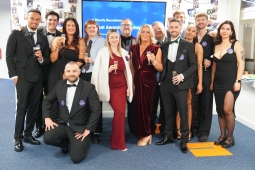 Looking Back on 2025: A Year of Growth, Impact and New Beginnings at Priority RecruitmentAs 2025 comes to a close, it’s the perfect moment to reflect on an incredible year for Priority Recruitment. From…Learn More
Looking Back on 2025: A Year of Growth, Impact and New Beginnings at Priority RecruitmentAs 2025 comes to a close, it’s the perfect moment to reflect on an incredible year for Priority Recruitment. From…Learn More
